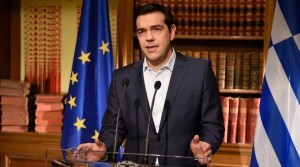Greek Prime Minister Alexis Tsipras on Tuesday repeated his call for a “no” vote in Sunday’s hastily called referendum over creditors’ proposals, as he again took to the airwaves for a third time since shocking European partners with the snap plebiscite.
Nevertheless, facing shrill criticism over unprecedented capital controls in the country, which limit Greek bank account holders to 60 euros per day per account, and almost universal condemnation by his euro-area peers for the decision, he nevertheless said that he’ll “immediately return” to negotiations for a solution after the referendum — without mentioning the outcome.
The radical leftist PM had originally been scheduled to make the address at 2 p.m. (12.00 GMT) but appeared three hours later.
His mostly defiant address defended the holding of the referendum, spelled out the reasons for his refusal to accept creditors’ demands and was accusatory of “ultra-conservative” circles, as he maintained, that caused the week-long bank holiday in the country.
Tsipras told an increasingly jittery nation that a ‘no’ vote was not tantamount to a rejection of Europe or the euro, but would instead pressure creditors to cough up a viable agreement.
“Sunday’s referendum does not concern our country’s place in the euro, this is a given and no one can doubt it,” he emphasized.
He pointed to the government’s proposals to ensure that pensioners have a “respectable pension and not just a tip.” He underlined that democracy does not entail “deadlocks”. He also promised that wages, pensions and the savings of those that had elected not to transfer their money abroad are safe.
He said that a ‘no’ vote on the July 5 referendum is the “clear choice of the nation as to how they will live the next day. No does not mean a crisis in Greece but a return to European ideals.”
The Greek PM said that he would do all he can for difficulties to face Greece to be overcome as smoothly as possible. “I call on you to say no to memorandum formulas that are destroying Europe,” he said.
Responding to claims that he has a “secret plan” to lead the country out of the euro, he reminded that austerity and memoranda are not the way out of the crisis and that the program implemented in Greece. He said that whoever wants a stagnant Europe are not “visionaries for Europe”.
“Democracy is not a coup, the sold-out governments are a coup,” he said, thanking Greece for their calmness while giving assurances that the situation will not continue for long. He invited Greeks to say ‘no’ to catastrophic policies as an obligation to their parents, children and as a duty to history.
Other Tsipras highlights:
— Last offer by creditors was replete with pension cuts; his government wants to protect pensioners’ income
— Referendum has already begun bearing fruit with improved terms being floated by creditors, and two teleconference Eurogroup sessions again held this week on the Greek issue
— The SYRIZA government will promptly return to the negotiations table on Monday
— Call for referendum was not a coup but a democratic expression, allowing the people to decide, similar to past referendums in France and Ireland on questions of European treaties
— Plugging liquidity for the Greek banking system merely shifted “blackmail” aimed at his government to ordinary Greeks
— “Yes” vote would be a retreat, echoing past governments’ “yes to everything”, he charged, echoing his party’s pre-election criticism of the coalition government he succeeded.
— Debt restructuring an imperative for his government
— “No” will shift burden to wealthier Greeks, not middle- and lower-classes, lead the way for a return to borrowing from the markets and “punish dens of corruption in the country”.
Ask me anything
Explore related questions





